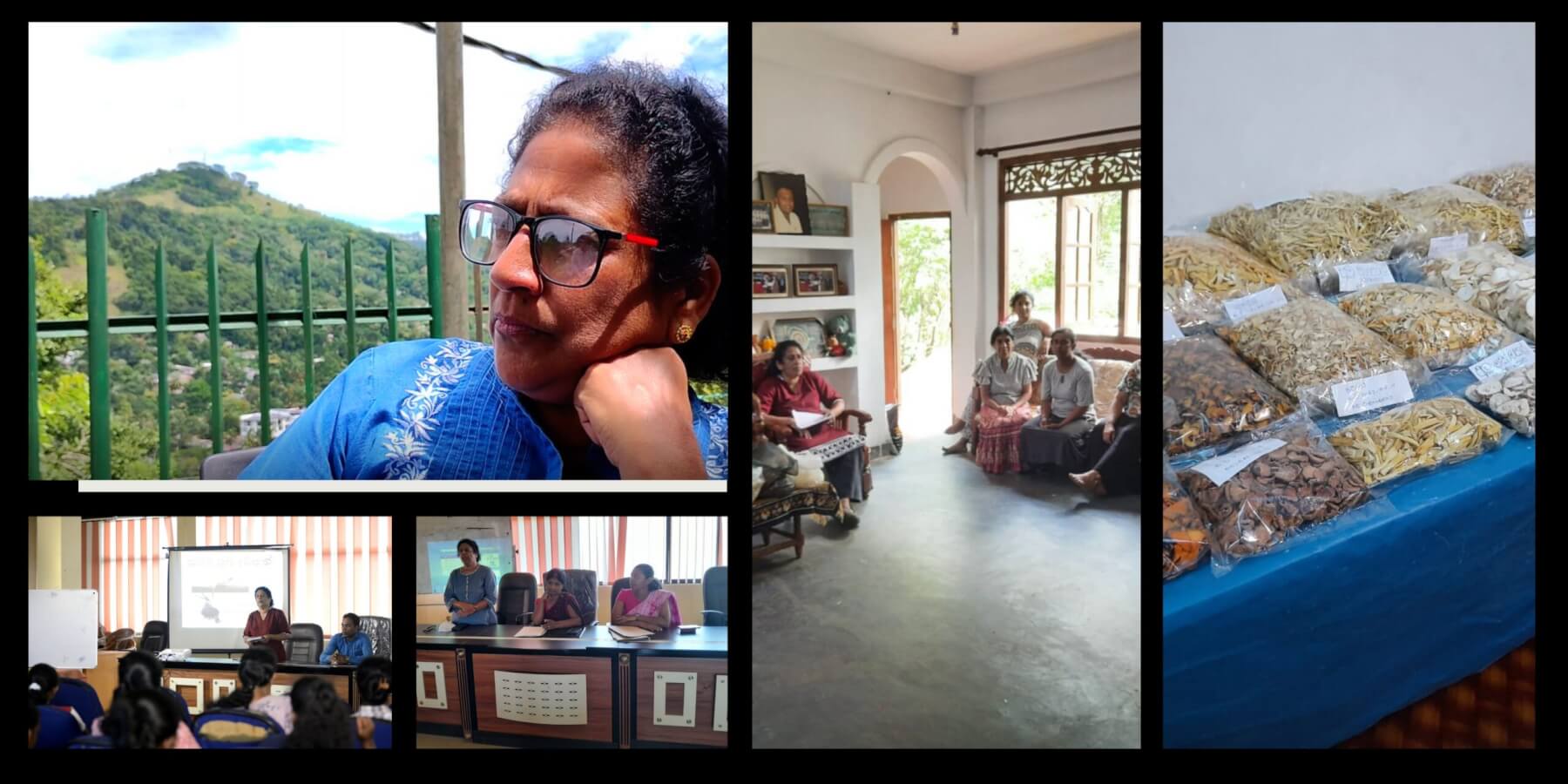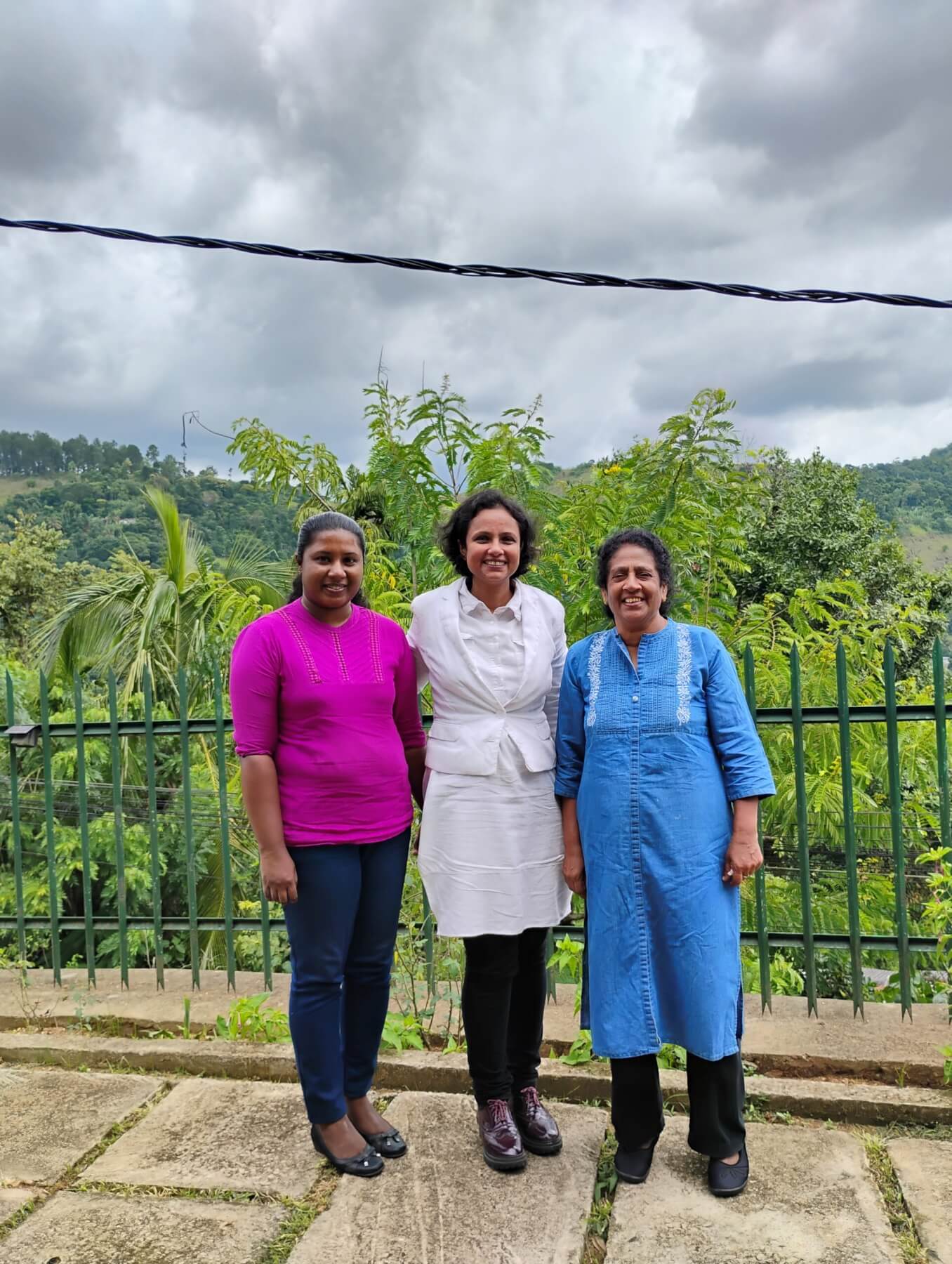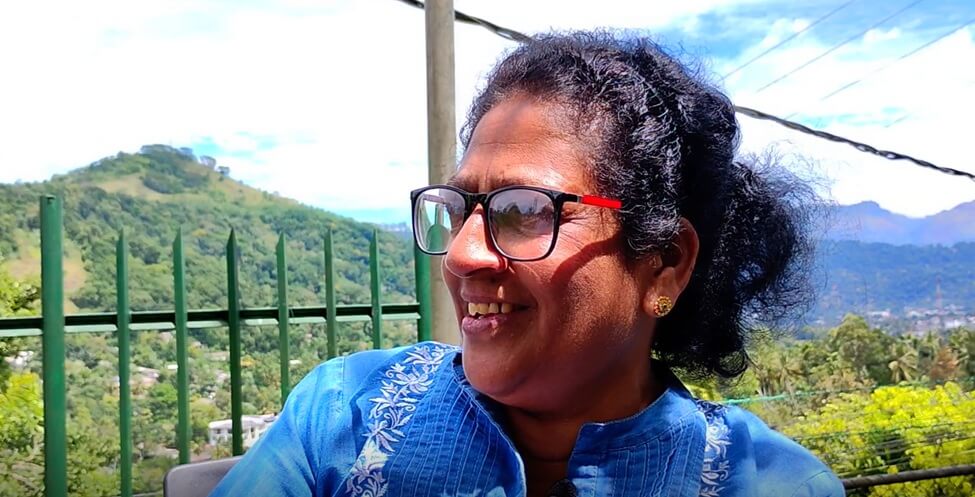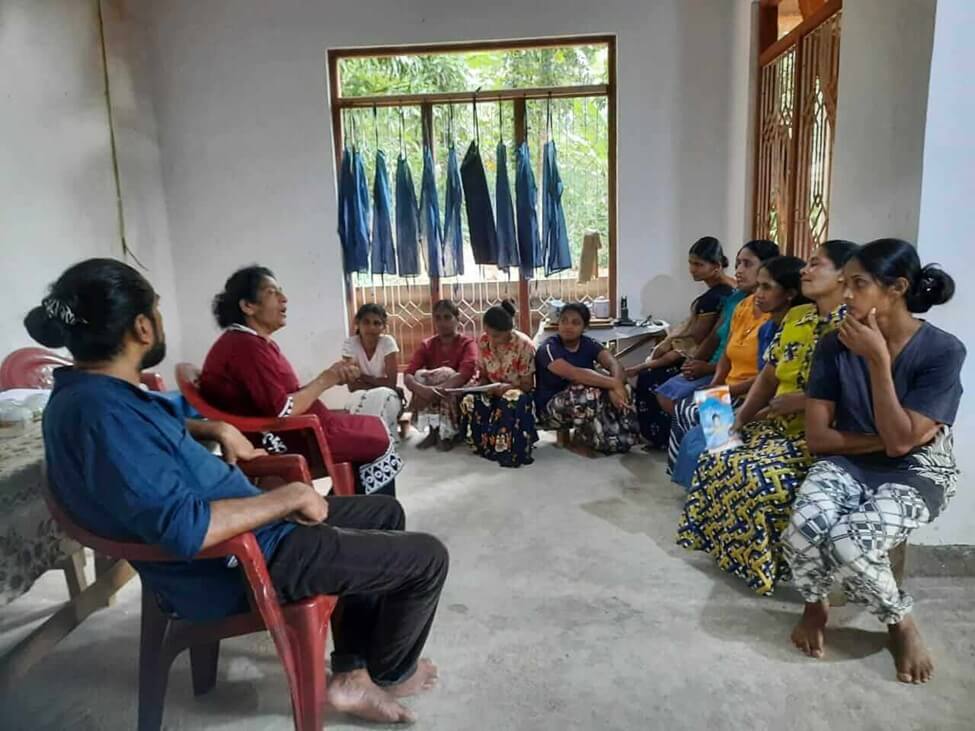
Empowering Communities and Transforming Lives: The Pioneering Work of the Women’s Development Center (WDC)
On August 12, 2024, Mrs. Ashinsa Bopearachchi, Chairperson of Renaissance Sri Lanka, met with Mrs. Chandra Wedagedara, Head of the Women’s Development Center (WDC), to discuss the organization’s journey and its contributions to women’s rights and empowerment in Sri Lanka. As WDC approaches its 30th anniversary in 2025, Mrs. Wedagedara reflected on its origins, challenges, and the collective efforts that have driven its mission over the years.
Founded in 1995, the WDC was established as a response to the widespread gender discrimination and domestic violence experienced by women, especially in economic, social, and political spheres. This environment presented significant obstacles, prompting Mrs. Wedagedara and five other pioneering women leaders to form WDC. Their goal was to create a platform that could address the needs and challenges of women in the region, particularly in Uva Province, where resources were limited. Among the founding members was Mrs. Ekanayake, the Officer-in-Charge for children and women’s welfare in Badulla district, alongside influential women development officers who worked with village women’s societies.

Mrs. Ashinsa Bopearachchi is with Mrs. Chandra Wedagedara and Mrs.Lakshika Sandamali © Renaissance Sri Lanka
As WDC grew, it gained support from organizations such as Plan Sri Lanka, Sarvodaya, and other NGOs. These partnerships bolstered its capacity to address the issues affecting women’s rights, especially in a context where women faced limited social, economic, and political opportunities. At the time, the only formal support network was the “Kantha Pihita” program, which provided temporary relief but lacked long-term solutions.
Mrs. Wedagedara highlighted those local institutions, such as Samatha Mandalayas (reconciliation boards), were overwhelmingly male-dominated, with women making up less than 1% of decision-makers. This imbalance meant that women experiencing violence or discrimination often had limited support and faced intimidating environments that overlooked their issues or dismissed them lightly. Recognizing this gap, WDC sought to establish a grassroots network that could represent women from the village level to national decision-making platforms, advocating for solutions that go beyond temporary aid and address the underlying causes of injustice.
Mrs. Bopearachchi emphasized the importance of amplifying the voices of women in decision-making processes and creating sustainable support systems that empower women to lead change in their communities. Through this partnership, both organizations aim to build on WDC’s legacy, promoting greater equity, justice, and resilience for women across Sri Lanka.
Empowering Women in Sri Lanka: An Interview with Mrs. Wedagedara on Overcoming Barriers and Building Leadership
Mrs. Wedagedara, a leader and advocate for women’s empowerment, shares insights into the challenges faced by women in traditional Asian societies and the initiatives spearheaded by the Women Development Center (WDC) to address these issues. From social pressures at home to inequality in the workplace, her journey highlights the resilience and determination needed to foster change in women’s lives.
Overcoming Cultural Barriers
Mrs. Wedagedara begins by outlining the common challenges faced by many Asian women. In a traditional family structure, women are often expected to seek permission from their husbands, parents, or even siblings to engage in activities outside the home, whether for employment, education, or community work. Without such approval, many women are confined to their domestic roles, limiting their potential to pursue personal and professional aspirations. “Women face injustice not only within their homes but also from broader society,” she notes, underscoring the pervasive nature of these obstacles.
Empowering Women Through Awareness and Training
The WDC, founded with a mission to uplift women, plays a significant role in addressing these issues. The organization educates women on their rights, encourages them to voice their opinions, and advocates for gender equality. Through targeted training programs, WDC equips women with the skills and confidence to pursue leadership positions within their communities. “We train them to transform their thinking and inspire them to hold positions such as president, secretary, or treasurer,” explains Mrs. Wedagedara. By fostering leadership, WDC empowers women to contribute meaningfully to societal development and break free from traditional limitations.
A Personal Journey of Resilience
Mrs. Wedagedara’s personal story is a testament to her commitment to women’s empowerment. Originally from Nawalapitiya in the Kandy district, she began her career as a teacher in Monaragala district following her husband’s appointment there. After relocating several times due to her husband’s work, she eventually joined Plan Sri Lanka, where she dedicated eight years to community development. However, as a mother, she faced significant challenges balancing work and family life. The lack of family support for childcare, combined with pressures from her workplace, especially during pregnancy, left her feeling disappointed and disillusioned. Additionally, when promotion opportunities arose, she faced external pressures and scrutiny, simply because she was a woman.

Mrs. Chandra Wedagedara during the interview © Renaissance Sri Lanka
Undeterred, Mrs. Wedagedara turned these experiences into a source of motivation. From 1995 to 1997, she volunteered alongside other women, which eventually led to the establishment of WDC, where she initially served as secretary. She recalls, “Before we even began applying for project proposals, various organizations approached WDC, eager to collaborate and support our mission.
Encouraging Youth Leadership
The Women’s Development Center (WDC), guided by a dedicated board of directors, plays a pivotal role in addressing social, economic, and human rights issues in the Badulla district and beyond. Its strategic leadership and youth-focused initiatives have positioned it as a significant force for positive change in Sri Lanka.
The WDC prioritizes empowering young leaders, recognizing their potential to contribute to the country’s development. By encouraging youth involvement, the organization instills a sense of responsibility and commitment towards society. One key initiative is the formation of a Youth Media Unit, which serves as a steppingstone for aspiring young leaders to gradually engage in impactful projects within WDC.

Mrs. Ashinsa Bopearachchi is with Mrs. Chandra Wedagedara during the interview© Renaissance Sri Lanka
Key Achievements of WDC
- National-Level Recognition and Goodwill – WDC has become synonymous with Badulla, gaining national recognition for its impactful work. The goodwill it has cultivated ensures collaboration with other organizations for socially beneficial projects. This reputation, along with the leadership of figures like Ms. Lakshika, has made WDC a trusted partner within the NGO and civil society network.
- Leadership in Advocacy Forums – WDC holds influential positions in the Badulla district’s NGO and Civil Society Forum. The organization serves as a pressure group addressing pressing issues related to environmental conservation, economic stability, and human rights. For instance, WDC, as the secretary of a forum comprising 44 organizations, advocates against unjust actions such as deforestation and human rights violations.
- Women’s Day Leadership – In 2024, WDC played a central role in organizing the Human Rights Commission’s World Women’s Day event in Badulla, Sri Lanka. Themed “Women, Empowerment, and Entrepreneurship,” the program highlighted WDC’s expertise in empowering women through education and economic opportunities.
- Women Learning and Leadership Club (WLL Club) – WDC established the WLL Club, a network of 100 women from diverse backgrounds, including various political affiliations, social strata, educational levels, and individuals with special needs. These women are trained in human rights, gender equality, and law, enabling them to collaborate with government agencies to advocate for women’s welfare. A notable example is their work with local authorities to ensure that public facilities like toilets are gender-sensitive, accessible, and inclusive.
- Facilities for Tea Plantation Workers – WDC has enhanced the welfare of tea plantation workers in Badulla by constructing restrooms equipped with lunch areas and sanitary facilities for women tea pluckers. This initiative addressed a critical need and inspired plantation trusts to replicate these efforts.
- Women-Friendly Police Stations – In collaboration with donors, WDC established five women-friendly police stations in Monaragala, including locations like Wellawaya and Gonaganwaya. These stations provide safe spaces for women to report violence or abuse confidentially to women police officers. The stations also include play areas for children, ensuring a supportive environment for victims.
Future Aspirations and Community Needs
Mrs. Wedagedara, a key advocate for WDC’s initiatives, emphasized the urgent need for a women’s hostel in Badulla to support homeless women. Many women become homeless due to family disputes or abusive situations, and a shelter would offer them a safe place until they can rebuild their lives.
Creating Partnerships and Lasting Impact
Under Mrs. Wedagedara’s leadership, WDC has become a beacon of hope and progress for women across Sri Lanka. Her commitment and the organization’s accomplishments continue to attract support from various groups and sponsors. The success of WDC is a testament to the power of community-driven change and the impact of empowering women to overcome cultural and institutional barriers.
Looking Forward
Mrs. Wedagedara’s vision for the future is clear: to create an environment where women can exercise their rights freely and take on leadership roles without fear of discrimination or restriction. Her work with WDC highlights the importance of support networks, education, and resilience in building a society where women are not only heard but are also instrumental in shaping the nation’s future.
Support from Renaissance Sri Lanka
Mrs. Wedagedara praised Renaissance Sri Lanka for its Dry Food Project (Read More), which has significantly supported women empowerment. This initiative highlights the importance of partnerships in achieving shared goals of community upliftment (Read More).

RSL & WDC project “Empowering 350 women in Badulla Districts through dry food business” © WDC
The Women’s Development Center’s contributions have not only improved lives but also set benchmarks in advocacy, empowerment, and collaboration. Through its visionary leadership and commitment to youth and women’s welfare, WDC continues to inspire transformative change across Sri Lanka. Renaissance Sri Lanka is proud to be partners with WDC to foster empowerment for the women of Sri Lanka.
Reference
Interview of Mrs. Chandra Wedagedara by Ashinsa Bopearachchi on August 12th, 2024, at Badulla, Sri Lanka.



